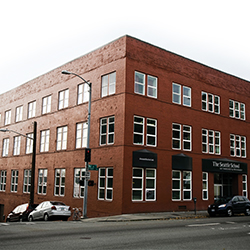Ah yes, the perennial question: What about working while in school? Some students depend solely on student loans, while others utilize savings or family income, but the majority of our students work while studying at The Seattle School. When anticipating the start of grad school, it can be difficult to know what kind of job (and how many hours) will work best while managing class and studying as well. To help you imagine what this transition might be like for you, we’re sharing a snapshot of how students coordinate work and school, including some of the helpful job search resources we’ve found along the way.
What will my school week look like?
This is one of our most frequently asked questions, and understandably so. The Seattle School is designed to be a full-time graduate institution, meaning classes (for both low-residency and on-campus students) typically take place during the week between the hours of 9:00 am and 7:00 pm, so it’s rarely feasible to work full-time (30-40 hours) while being a student full-time (7-10 credit hours).
With that said, we try to give students consistency in their schedules depending on their program modality. Weekly on-campus classes are typically held on Mondays and Tuesdays, while weekly online classes are normally held on Wednesdays and Thursdays. Due to intensives and lab-style courses, there is some variance in the days you have classes, but the bulk of your classes will line up with those days.
How many hours a week do most students work?
Many students enjoy working a flexible part-time job between 15-30 hours a week while studying full-time. Some students also choose to work more hours per week and take fewer credits per term. What works best for you will depend on your study habits, class schedule, family commitments, and other factors.
What else should you know when considering what job will work best for you?
- Graduate studies in general require a significant investment of time and energy. Graduate studies at The Seattle School invite a level of academic and emotional engagement that increases this investment of time and energy. Be kind to yourself and wise as you explore your own capacity for this work.
- The Seattle School has a trimester system. Fall Term is September through mid-December, Winter Term is January through March, and Spring Term is late-April through mid-June.
What jobs most often work best for students at The Seattle School?
There are a few types of jobs common to Seattle School students. We recommend reflecting on the impact of the type of work you choose as it relates to your emotional, social, physical, and financial health. Some students feel energized working with kids as a nanny, while others prefer having more independent work online.
Nannying
For those of you who love children or might have baby-whisperer skills, nannying is a job with flexible hours and good pay. Here are some ways to find nannying gigs:
- There are websites you can upload your resume and search for openings. Families can also search for you. Think LinkedIn for nannying
- There are also respectable nanny agencies that hire you to represent their agency, pair you with a compatible family, and manage pay, time off, problems, etc. For Seattle residents, Annie’s Nannies is a popular option.
- Elliott’s Wall is also a great place to look for job openings. Alumni will often advertise there for their kids’ nannies.
- Word of mouth! Amidst this relational work, it seems like people who nanny almost always know of at least one family who has asked them for referrals.
Work Study
The Seattle School does have federal work study positions in multiple departments, including in admissions, The Allender Center, admissions, and the front desk, requiring on-campus presence. We also have student contractors for jobs like note taking. Open positions will be posted on our Current Openings page later this summer. Here is important information to know:
- First, once your financial aid has been awarded, find out if your financial aid package qualifies you for work study funding. Our Student Financial Services Coordinator, Ligaya Avila, can tell you all about this.
- Second, read the newsletter, which you will begin receiving once you enroll. It’s good to get in the habit of doing that anyway, as the newsletter is the primary way work study jobs at the school get advertised—along with all the other important community information!
- Third, you can apply for openings just as you would any other job. Fill out the application form (sometimes you have to send an email to request it) and email your resume and cover letter.
Part-Time Jobs with Insurance
For students in Seattle, here are some local companies that offer insurance to part-time employees. Usually they require that you work a certain number of hours, such as an average of 21-25 per week. It depends on the company, so don’t be afraid to ask.
- Starbucks
- Lowe’s
- REI
- Trader Joe’s
Also, some companies consider you full-time and offer benefits if you work a minimum of 30-32 hours. Most students find that a bit too much to accomplish on top of school, but there are some who do it.
The Restaurant Industry
Waiting tables can offer good paychecks in the city. In Seattle, for example, servers make minimum wage—$17+ an hour, depending on the company—plus tips.
Ministry and Counseling Jobs
If you’re looking to find employment in the industry you hope to work in upon graduation, you’re not alone. Elliott’s Wall often has postings from social service agencies, mental health hospitals, and churches, even from around the country. Depending on your previous experience or education, some of these may be a great fit. Mental hospitals and agencies occasionally need on-call staff or overnight workers, and some students have found this to be a schedule that works for them.
With church jobs, depending on your financial situation, this may or may not be enough financial support during this season. Of course, that varies depending on placement.
Administrative Jobs
Some people like to do temp work because they can say yes when they’re available and no when they’re not. Also, it’s possible to find administrative positions that are part-time at churches, businesses, and in the public sector.
Self-Employed
- In Seattle: For those of you daring enough to try and start a business while attending graduate school, How to Become Self-Employed in Seattle by Jenny MacLeod is a great resource. It’s also worth a read if you already own your own business and want some advice on how to succeed setting up shop in the Emerald City. Buy it wherever books are sold, or check out our copy from The Seattle School’s Library once you get your student account!
- Other resources for starting your own business: EMyth website
Remote Work
For those of you not planning a move to Seattle, or for any who prefer the convenience of working from home, check out:
- Flex Jobs
- We Work Remotely
- This article features 65 different places to find and land remote work!
Gyms / Fitness / Dance / Yoga Studio Front Desk
A wonderful part-time opportunity might be working for fitness studios. Gyms, fitness, dance, or yoga studios are often busy outside of business hours such as early mornings, evenings, or weekends–making it conducive for working while navigating daily class schedules. Students have sometimes received perks for these jobs, for example, free or discounted classes at the studios they work for, and the supportive, community-based ethos and empowerment of these communities could be just the space to unwind while not in the classroom.
How do people find jobs?
Here are the most helpful job-searching resources we’ve found.
Internally
- Elliot’s Wall: This is the Seattle School online notice board. You can find housing, employment, and classified notices here (you can also post them!). All you need to access this page is your personal “@theseattleschool.edu” email address.
Externally
- Association of Washington Cities: (AWC) is a private, nonprofit, non-partisan corporation that represents Washington’s cities and towns. The AWC Jobnet board posts various types of positions with Washington cities and towns.
- CareerEco: An online community for eco-minded jobseekers and employers.
- Craigslist: Believe it or not, this is a great resource for job openings (Craigslist also has a map search feature that allows you to search for work within specific geographical locations).
- Idealist: Find opportunities at more than 25,000 nonprofit and community organizations in 153 countries.
- Jobdango: It’s the most popular and most visited job site in the Northwest! Based in Portland, Oregon, Jobdango was built to serve the people of Oregon and Washington.
- NWClassifieds: A service of The Seattle Times Company, representing the Seattle Post-Intelligencer.
- USA Jobs: The official site for federal jobs and employment information. Search by agency, location, or job type functions.
- Worksource: A local job board from a joint venture of organizations dedicated to addressing Washington State’s employment needs.
Temp Agencies
- Another Source: Serves Pacific Northwest companies who are seeking qualified employees in customer service, office administration, accounting, human resources, and sales fields.
- Express Employment Professionals: Express Employment Professionals makes it easy—whether you’re looking for work tomorrow, a job next week, or a career move for the rest of your life. Once they get to know you, they match your skills to client opportunities. The rest is up to you.
We hope these resources will be helpful as you discern and explore your options for working as a student!


